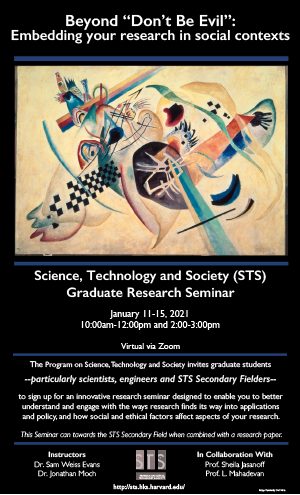Program on Science, Technology and Society at HarvardHarvard Kennedy School of Government | Harvard University |
|||||||
|
|
Beyond 'Don't be Evil': Embedding your research in social contextsJanuary 11-15, 2021, 10am-12pm and 2-3pm AbstractThe STS Program invites graduate students--particularly engineers and STS Secondary Fielders--to sign up for an innovative research seminar designed to enable you to better understand and engage with the institutional channels through which research finds its way into applications and policy, and how social and ethical factors affect aspects of your research. This Seminar may count as a course for the purposes of the STS Secondary Field upon completion of an additional paper. No other course credit will be offered. Registration is required. If you are interested in taking this STS Research Seminar, please register here.
Course DescriptionEngineers and scientists often pursue their research in the hope that their discoveries and inventions will benefit the world. Yet, few have significant insight into the institutional channels through which research finds its way into applications and policy, nor how social and ethical factors influence aspects of their research. This intensive one-week course is designed to help graduate science and engineering students grapple with the challenges of moving from research idea to social benefit (or harm) by providing a conceptual framework drawn from Science and Technology Studies (STS). The introduction of STS concepts will be linked to exercises in analyzing the students’ own research projects. The course will offer a mix of lectures, guest speakers, and intensive student participation. Students taking the course are expected to bring some ideas about the social aspects of their current or future research projects. Examples of issues to be considered include: What social, economic, and ethical assumptions are already reflected in the framing of your research? When is it appropriate to address questions about the ethical, political, and organizational issues you encounter in research, and which questions do you consider especially important to explore? What avenues, if any, exist for people outside your immediate lab group to question those assumptions? How do you reach out for feedback on the societal implications of your research, and to whom? Could you tailor your work to more explicitly engage, and possibly incorporate, social values? More broadly, the course will cover why these types of questions are currently so hard to ask in engineering training, and explore what can be done to change this. InstructorsSam Weiss Evans, Lecturer, School of Engineering and Applied Sciences and Senior Research Fellow, Program on Science, Technology & Society Jonathan Moch, Postdoctoral Fellow, Paulson School of Engineering and Applied Sciences and T.C. Chan School of Public Health in collaboration withSheila Jasanoff, Pforzheimer Professor of Science and Technology Studies, Harvard Kennedy School L. Mahadevan, Lola England de Valpine Professor of Applied Mathematics, Professor of Organismic and Evolutionary Biology, and Professor of Physics This Research Seminar is sponsored by the STS Program's Schmidt Futures grant on "Ethics in the Lab" |
||||||
